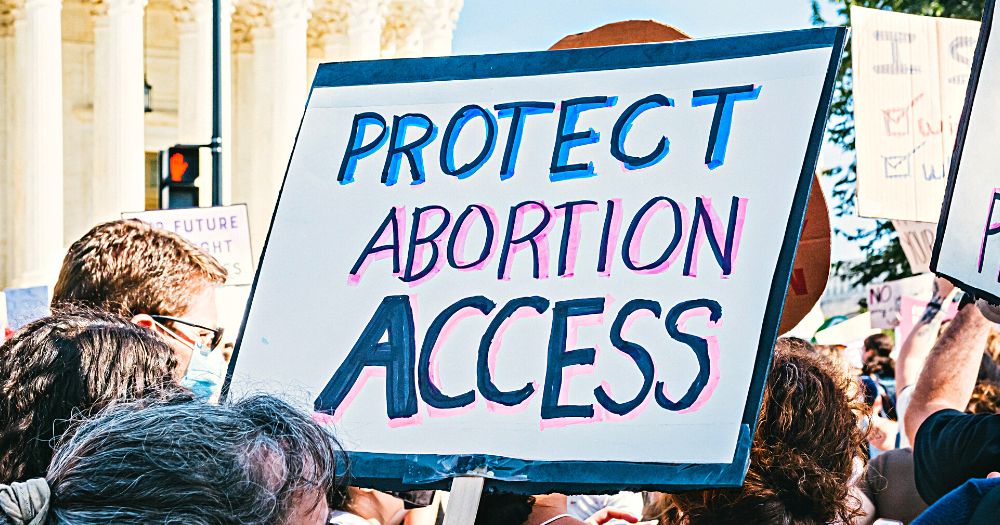On June 24, the United States Supreme Court overturned the Roe vs Wade case. This historic case was the foundation for the abortion legislation that was effective in the entire country for almost 50 years. The LGBTQ+ community has been protesting the decision and emphasising that many queer folks are severely affected by the removal of abortion rights.
According to an analysis made by the HRC, lesbians (22.8 %) and bisexual women (27.2%) are more likely to have had an abortion than heterosexual women (15.4%). However, members of the LGBTQ+ community “have been left out of the conversation almost entirely, even by supposedly ‘progressive’ voices”.
The document issued by the Supreme Court on Friday says that “the Constitution does not confer a right to abortion; Roe and Casey are overruled; and the authority to regulate abortion is returned to the people and their elected representatives”. Since then, the Washington Post reported that 15 states have already banned or are set to ban access to abortion soon.
Furthermore, the ban on abortion rights also impacts another section of the LGBTQ+ community, which is the Trans community that are currently taking hormones and/or puberty blockers. Most often, the clinics that offer abortion procedures are the ones that also provide gender-affirming healthcare.
Cathryn Oakley is a Human Rights Campaign attorney and said that “having those clinics be open and able to operate are important”. Otherwise, we will see Trans people in the US having to travel hundreds of miles to be able to visit clinics that offer hormone care, which is a step back on LGBTQ+ health and safety.
“Overturning Roe v Wade will allow states to further restrict and regulate essential health care and reduce access to the already limited number of LGBTQ+ competent providers in many parts of the country, posing a threat to the health and safety of young LGBTQ people”, says Amit Paley, CEO and executive director of LGBTQ+ charity The Trevor Project.
? Overturning #RoeVWade poses a threat to the health and safety of LGBTQ young people ?
Here are some reasons why reproductive healthcare rights matter to LGBTQ young people ? pic.twitter.com/JeqarHx1bw
— The Trevor Project (@TrevorProject) June 24, 2022
In May 2022, when the leaked draft opinion suggested that the Roe v Wade ruling was set to be overturned by the Supreme Court, US president Joe Biden warned that same-sex marriage could be at risk. Then, after the case was overruled, Justice Clarence Thomas wrote: “in future cases, we should reconsider all of this Court’s substantive due process precedents, including Griswold (contraception), Lawrence (sodomy laws), and Obergefell (same-sex marriage)”. Those statements have been alarming the LGBTQ+ community in the US as they fear they could lose even more rights.
Same-sex marriage became a constitutional right in the United States in 2015 through the case Obergefell v Hodges. And even though, according to Gallup, 71% of Americans support same-sex marriage, the LGBTQ+ community has been struggling to have their rights fully recognised.
One of the biggest issues that same-sex couples still face is the right to adopt a child. The Trump administration vowed to remove all protections in federally funded adoption and foster care centres, allowing some states to create measures that exclude LGBTQ+ families from foster care and adoption.
Multiple same-sex couples throughout the US stated that they were denied in the process of adoption because the foster care centres were managed by religious entities. Therefore, those institutions believed a child should have a mother and a father, which means that same-sex couples were not suitable for raising a child.
In recent years, LGBTQ+ activists found an increase in the number of lawsuits trying to prevent same-sex couples from adopting or fostering children. Some state legislations got to a point where they were making it difficult even for same-sex parents to be granted rights to children they conceived via artificial means.
USA Today told the story of Daneya Esgar and her wife, Heather Palm. They had a daughter using in vitro fertilisation (IVF) in which the egg used to conceive the embryo was from Heather, and Daneya carried the baby. After the baby was born they found out that Heather would have to go through the adoption process in order to be on her daughter’s birth certificate as she was not the one who gave birth to her. During the interview she said, “I can’t believe this is still something that exists that no one talks about. You would never assume things are still so unequal”.
However, LGBTQ+ activists are urging the community to not despair wondering what might come next after several states are expected to ban abortion, but rather focus on how they can fight to ensure they can protect their rights.
© 2022 GCN (Gay Community News). All rights reserved.
Support GCN
GCN is a free, vital resource for Ireland’s LGBTQ+ community since 1988.
GCN is a trading name of National LGBT Federation CLG, a registered charity - Charity Number: 20034580.
GCN relies on the generous support of the community and allies to sustain the crucial work that we do. Producing GCN is costly, and, in an industry which has been hugely impacted by rising costs, we need your support to help sustain and grow this vital resource.
Supporting GCN for as little as €1.99 per month will help us continue our work as Ireland’s free, independent LGBTQ+ media.
